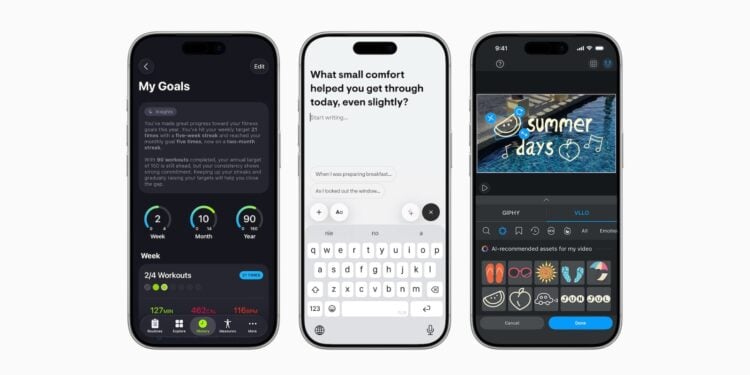With iOS 26, iPadOS 26, and macOS 26, Apple is introducing the new Foundation Models framework. It is the foundation for Apple Intelligence, a large on-device language model that makes apps more intelligent while preserving privacy. It allows developers to build new features directly on devices without data ever leaving the systems. The framework ensures that AI experiences remain private, powerful, and available offline—opening up entirely new possibilities for app development.
Apple is committed to ensuring that artificial intelligence doesn't come at the expense of privacy. The Foundation Models Framework provides a tool that offers decisive advantages for both developers and users. Instead of relying on complex backend structures, the functions run natively on iPhone, iPad, or Mac. Initial apps already demonstrate the broad range of applications: from fitness and journaling to education, creativity, and productivity.
Health and fitness: Intelligent routines and smart analyses
The fitness app SmartGym uses the framework to automatically convert described workouts into structured routines with repetitions, rest periods, and equipment adjustments. The Smart Trainer function learns from the data and suggests individual adjustments – including explanations of why a change makes sense. It also offers monthly overviews, routine breakdowns, and automatic notes that capture training experiences. The diary app Stoic creates personalized prompts based on recent entries. Those who note sleep problems or a bad mood receive appropriate suggestions or reminders. All data remains locally on the device. Furthermore, entries are automatically summarized, sorted by topic, and easier to find via improved voice search. Other fitness apps also benefit. SwingVision analyzes tennis and pickleball videos and provides precise feedback. 7 Minute Workout enables workouts via voice input, takes injuries into account, and offers motivational tips. Gratitude creates weekly summaries with affirmations. Train Fitness recommends suitable exercises if you're missing equipment. Motivation organizes content by emotional categories, Streaks automatically categorizes to-dos, and Wakeout! generates movement breaks with appropriate justification.
Education: Learning becomes more interactive
CellWalk brings cell biology to life. With 3D visualizations down to the molecular level, terms can be selected, which are then explained in a dialogue-oriented manner. The framework adapts explanations to the user's level of knowledge and saves the learning progress. Other learning apps also use Apple technologies. Grammo offers an AI tutor for English grammar that explains incorrect answers and spontaneously creates new exercises. Lil Artist combines the framework with the ImageCreator API to generate illustrated stories tailored to children's needs. Vocabulary automatically organizes saved words into topics such as verbs or anatomy. The Platzi platform answers context-related questions about video lessons directly within the app.
Creativity and Productivity: New Ways of Working with AI
The productivity app Stuff understands inputs directly and automatically organizes tasks into lists or calendars. In List mode, spoken thoughts are instantly turned into to-dos, while in Scan mode, handwritten notes are digitized and filed. VLLO takes video editing to a new level. Using Apple Intelligence and the Vision Framework, the app analyzes video previews and suggests suitable music and stickers. Other examples include Signeasy with document summaries, Agenda with the intelligent assistant Ask Agenda, and Detail: AI Video Editor, which generates a complete teleprompter script from an outline. Essayist extracts information from PDFs and instantly creates references in the desired citation style. OmniFocus 4 uses this technology to automatically structure projects and suggest next steps.

Development with the Foundation Models Framework
The framework is directly integrated with Swift. Developers can query the model with three billion parameters, leveraging guided generation to ensure consistent results. They can also provide tools to query the model for missing information. It is supported by iOS 26, iPadOS 26, and macOS 26 on all Apple Intelligence-compatible devices. Apple Intelligence is currently available in beta. Supported languages are English, French, German, Italian, Brazilian Portuguese, Spanish, Simplified Chinese, Japanese, and Korean. Some features may be regionally restricted.
This is how Apple understands the use of artificial intelligence
The Foundation Models Framework demonstrates Apple's understanding of artificial intelligence: powerful, locally processed, and delivering real value for everyday life. The range of apps demonstrates that the technology makes an immediate difference not only in specialized applications, but in many areas of life. Whether training, learning, creativity, or organization – with iOS 26, iPadOS 26, and macOS 26, Apple is setting a new standard for intelligent and private app experiences. (Image: Apple)
- Super Bowl 2026: Bad Bunny rocks the Apple Music Halftime Show
- Tile Tracker under fire: Risks to privacy and protection
- iOS 26.0.1: Apple's next update solves annoying iPhone bugs
- Apple and Foxconn: Report reveals harsh working reality
- Apple warns of DMA: When regulation becomes a risk
- Apple in Europe: What are the real consequences of the DMA?
- Fraudulent apps: Study shows enormous increase due to AI
- iPhone 17 Pro with scratches? Apple clarifies cause in stores





